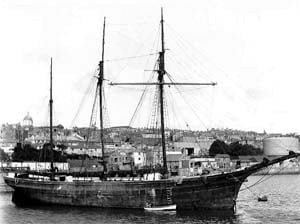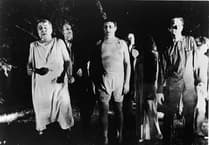GREAT train robber Ronnie Biggs, who died recently, had an unusual claim to fame – he was once accused of stealing a three masted schooner from Lydney Harbour.
Having been sentenced to a spell in a borstal at Usk, the young Biggs and a teenage colleague went on the run, desperately keen to make their way back to London where they were soon involved in more crime. Inside a month they were arrested again.
Biggs tells the story in his own words in a biography ' Ronnie Biggs...his own story'.
He described his journey from Usk to London as "four days of crazy events."
He wrote: "On the way to Gloucester we broke into a cafe and stole some cigarettes and stuff, which we then carried in a bag. We found two ARP greatcoats on the bonnet of an old Wolseley car which we couldn't get started, and took them."
Later they stole a Humber but rolled it into a ditch.
Biggs, now about to appear at the Old Bailey, asked for six offences committed during the trip from Usk to London to be "taken into consideration."
But the police, he wrote, had other ideas.
"The cop who tried it on me wanted me to plead 42 TIC. "It's all the same, you might as well have them all done. It helps us and I'll put in a good word for you." Then he started on about my having stolen a schooner.
"Schooner! What do you mean, stole a schooner?"
He showed me the charge sheet: "Stealing a schooner, the William Ashburner, from its moorings in Lydney Harbour with a ten-ton load of corned beef."
"I said, "Where is the corned beef for Christ's sake? Where is the bloody boat now? I don't know anything about it, but just because you want it to be cleared off your books you want me to take it into consideration. Screw you, pal, but I am not going to plead guilty to things I didn't even do.
"As it was I got three and a half years: a month, I think, for each TIC."
It was not the last local people were to hear of the William Ashburner.
The old timer- built in 1876 at Barrow-in- Furness, was on passage in a thick fog from Swansea to Sharpness in February 1950 when she grounded on Chapel Rock. Lifted clear on the next tide, she drifted up and down the Severn for two days before the crew of the Old Passage ferry boat secured her to a slipway at Beachley.
She was later moored at Chepstow's Buffer Wharf before being taken to Hunger Pill where she was set on fire to enable valuable copper to be retrieved.




